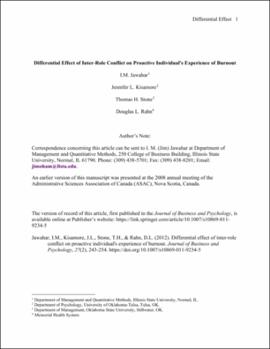| dc.contributor.author | Jawahar, I.M. | |
| dc.contributor.author | Kisamore, Jennifer L. | |
| dc.contributor.author | Stone, Thomas H. | |
| dc.contributor.author | Rahn, Douglas | |
| dc.date.accessioned | 2022-03-30T14:30:16Z | |
| dc.date.available | 2022-03-30T14:30:16Z | |
| dc.date.issued | 2012 | |
| dc.identifier.citation | Jawahar, I.M., Kisamore, J.L., Stone, T.H., & Rahn, D.L. (2012). Differential effect of inter-role conflict on proactive individual's experience of burnout. Journal of Business and Psychology, 27(2), 243-254. https://doi.org/10.1007/s10869-011-9234-5 | en_US |
| dc.identifier.uri | https://hdl.handle.net/11244/335119 | |
| dc.description | The version of record of this article, first published in the Journal of Business and Psychology, is available online at Publisher’s website: https://link.springer.com/article/10.1007/s10869-011-9234-5 | en_US |
| dc.description.abstract | Purpose:
This study examined how proactive personality interacts with inter-role conflict, measured as work–family conflict and family–work conflict, to predict burnout, measured as emotional exhaustion, depersonalization, and reduced personal accomplishment.
Design/Methodology/Approach:
Participants were 171 clerical employees. Hierarchical multiple regression was used to test whether proactive personality moderated the relationship between inter-role conflict and forms of burnout.
Findings:
Family–work conflict was not associated with burnout, but work–family conflict explained 30% of unique variance in emotional exhaustion and 9% in depersonalization. Proactive personality explained 12% of variance in personal accomplishment. Three-way interactions indicated that at high levels of work—family conflict and family—work conflict, proactive individuals reported lower levels of emotional exhaustion and personal accomplishment and higher levels of depersonalization than less proactive individuals.
Implications:
While previous research has generally documented the virtues of proactive personality, our research indicates that when simultaneously faced with work–family and family–work conflict, individuals with proactive personality experience more depersonalization and less personal accomplishment relative to less proactive individuals. Overall, results of three-way interactions imply that while a certain level of proactive personality may be necessary to buffer feelings of emotional exhaustion, beyond a certain level, proactive personality may lead one to experience higher levels of depersonalization and reduced personal accomplishment.
Originality/Value:
This study extends previous research by examining the influence of two types of inter-role conflict on all three dimensions of burnout. It also responds to calls for additional research on potential moderators, buffers, or even antidotes to stress by examining how proactive personality interacts with stressors. | en_US |
| dc.language | en_US | en_US |
| dc.subject | burnout | en_US |
| dc.subject | proactive personality | en_US |
| dc.subject | inter-role conflict | en_US |
| dc.subject | work-family conflict | en_US |
| dc.subject | family-work conflict | en_US |
| dc.title | Differential Effect of Inter-Role Conflict on Proactive Individual's Experience of Burnout | en_US |
| dc.type | Article | en_US |
| dc.description.peerreview | Yes | en_US |
| dc.identifier.doi | https://doi.org/10.1007/s10869-011-9234-5 | en_US |
| ou.group | Dodge Family College of Arts and Sciences::Department of Psychology | en_US |
